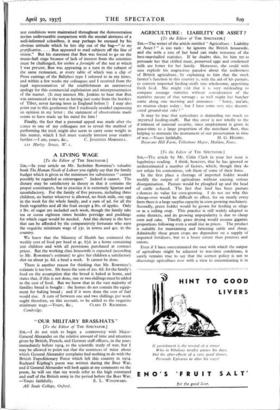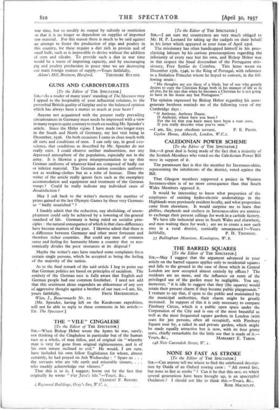[To the Editor of THE SPECTATOR.] SIR,—TE e article by
Mr. Colin Clark in your last issue is lugubrious reading. I think, however, that he has ignored or underestimated a number of factors, which, though they do not refute his contentions, rob them of some of their force.
In the first place a shortage of imported fodder would modify the output of agriculture without causing serious disorganisation. Pasture would be ploughed up and the head of cattle reduced. The fact that land has been pasture e chances its value for corn-growing. I do not see why this change-over would be difficult to effect, for on nearly every farm there is a large surplus capacity in corn-growing machinery. Secondly, green fodder would be grown for feeding as silage or as a soiling crop. This practice is still widely adopted in some districts, and its growing unpopularity is due to cheap corn and cake. Thirdly, grass drying would assume gigantic proportions following even a small rise in prices. The product is suitable for maintaining and fattening cattle and sheep. Admittedly these green crops are dependent on a supply of imported fertilisers, but to a lesser extent than potatoes and onions.
Even if I have overestimated the ease with which the output of agriculture might be adjusted to war-time conditions, it surely remains true to say that the correct policy is not to discourage agriculture now with a view to exterminating it in war time, but to modify its output by subsidy or restriction so that it is no longer so dependent on supplies of imported raw material. For this reason there is much to be said against an attempt to foster the production of pigs and poultry in this country, for these require a diet rich in protein and of small bulk, such as is impossible to devise without the addition of corn and oilcake. To provide such a diet in war time would be a waste of importing capacity, and by encouraging pig and poultry production in peace time we are destroying our main foreign sources of supply.—Yours faithfully,
Adam's Hill, Breinton, Hereford. THEODORE BULMER.



































































 Previous page
Previous page